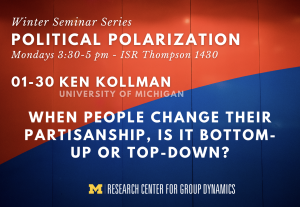Presented By: Research Center for Group Dynamics (RCGD)
RCGD Winter Seminar Series: When People Change Their Partisanship, is it Bottom-Up or Top-Down?
Ken Kollman

Ken Kollman, Political Science Department, Director of the Center for Political Studies, University of Michigan
When People Change Their Partisanship, is it Bottom-Up or Top-Down?
In studies of partisan political polarization, it is common to mis-specify the relationships among partisanship, issue-positions, and candidate evaluations. Partisanship is a complex phenomenon that requires attention to various factors that affect mass public opinion about political leaders. This research carefully specifies a theory and empirical model of partisanship that can account for dynamics in the reputations of political parties, the potential changes in policy preferences of people, and in people’s evaluations of politicians. The empirical results show that central to understanding partisanship dynamics are movements of parties in ideological space as perceived by the mass public. Thus, partisanship change is more of an elite-driven process than a bottom-up driven process. The findings have important implications for understanding contemporary polarization of American politics. This is joint research with John E. Jackson.
The U.S. is experiencing unprecedented levels of political polarization relative to the past few decades, especially in terms of affective polarization, or feelings of dislike and distrust towards members of the opposing political party. In this winter talk series, we will hear from experts across disciplines (social psychology, political science, sociology, communication) in order to better understand why political polarization is so high and what, if anything, can we do about it.
RCGD Seminars will be held at ISR Thompson 1430. Events will be recorded. Graduate seminars precede the events from 2-3:30. To meet with external speakers or to find out more about these events, contact Rachael Hamilton at rachaelr@umich.edu.
When People Change Their Partisanship, is it Bottom-Up or Top-Down?
In studies of partisan political polarization, it is common to mis-specify the relationships among partisanship, issue-positions, and candidate evaluations. Partisanship is a complex phenomenon that requires attention to various factors that affect mass public opinion about political leaders. This research carefully specifies a theory and empirical model of partisanship that can account for dynamics in the reputations of political parties, the potential changes in policy preferences of people, and in people’s evaluations of politicians. The empirical results show that central to understanding partisanship dynamics are movements of parties in ideological space as perceived by the mass public. Thus, partisanship change is more of an elite-driven process than a bottom-up driven process. The findings have important implications for understanding contemporary polarization of American politics. This is joint research with John E. Jackson.
The U.S. is experiencing unprecedented levels of political polarization relative to the past few decades, especially in terms of affective polarization, or feelings of dislike and distrust towards members of the opposing political party. In this winter talk series, we will hear from experts across disciplines (social psychology, political science, sociology, communication) in order to better understand why political polarization is so high and what, if anything, can we do about it.
RCGD Seminars will be held at ISR Thompson 1430. Events will be recorded. Graduate seminars precede the events from 2-3:30. To meet with external speakers or to find out more about these events, contact Rachael Hamilton at rachaelr@umich.edu.